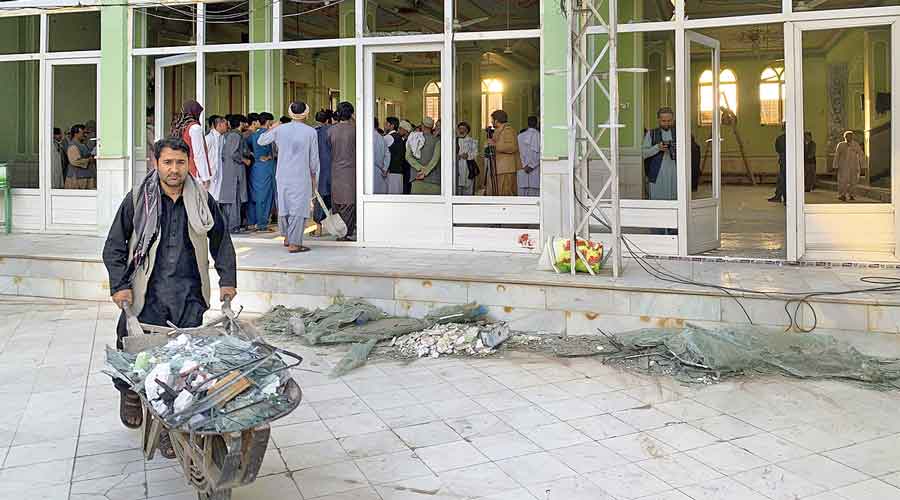A large explosion tore through a Shia mosque in the southern Afghan city of Kandahar killing at least 35 people, the second week in a row that militants bombed Friday prayers and killed dozens of worshippers from the minority sect.
There was no immediate claim of responsibility for Friday’s attack in Kandahar, but the Islamic State claimed the similar bombing that killed scores of Shias in the northern city of Kunduz a week earlier.
The attacks have caused shock and terror among members of Afghanistan’s Shia minority and undermine the ruling Taliban movement’s claim to have restored security since taking control of the country in August.
A health official at Kandahar’s Mirwais hospital told Reuters it had confirmed 35 dead and was treating 68 wounded.
A local reporter in Kandahar told Reuters that eyewitnesses had described three suicide attackers, one of whom blew himself up at the entrance to the mosque with the two others detonating their devices inside the building.
“The situation is very bad. Mirwais hospital is messaging and calling on young people to give blood,” he said.
Photographs and mobile phone footage posted by journalists on social media showed many people apparently dead or seriously wounded on the bloody floor of the Imam Bargah mosque.
Taliban spokesman Zabihullah Mujahid said security forces had been ordered to capture the perpetrators and bring them to justice under Islamic law.
Estimates of the death toll in last week’s attack in Kunduz have varied, with some reporting it as high as 80.
Sunni fighters of the Islamic State have repeatedly targeted Shias in the past with large-scale attacks intended to kill civilians, including one that killed scores of schoolgirls in a Shia district of Kabul in May last year.
The Taliban are also strict Sunnis but consider the Islamic State their enemy and have pledged to protect all ethnic and sectarian groups since sweeping into power in August as US forces withdrew.
The embassy of Iran, the region's largest Shia power, condemned the attack.
“We hope Taliban leaders take decisive action against these wicked terrorist incidents,” it said in a tweet.
The UN mission in Afghanistan said those responsible should be held to account. Taliban special forces arrived to secure the site and an appeal went out to residents to donate blood for the wounded.
The blast, coming so soon after the Kunduz attack, underlined uncertainty over security in Afghanistan as the Taliban grapple with an escalating economic and humanitarian crisis that threatens millions with hunger.
The local affiliate of Islamic State, known as Islamic State Khorasan after an ancient name for the region covering Afghanistan, has stepped up attacks following the Taliban victory over the Western-backed government in Kabul in August.
Taliban officials have played down the threat from Islamic State, and dismissed suggestions they may accept U.S. help to fight the group.
But the repeated attacks have undermined their claim to have brought peace to Afghanistan after four decades of war, and caused increasing unease from countries in the region about the potential for militant violence to spill out across the border.
The fact that the Shi'ite minority has again been targeted may also inflame tensions among ethnic and sectarian groups in the country, which is largely Sunni Muslim but ethnically diverse.
Most Shi'ites in Afghanistan belong to the Hazara ethnic group of Persian speakers, who have complained of persecution under the mainly Pashtun-speaking Taliban in the past.











